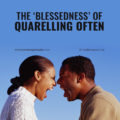(This is actually the third talk on the series “Conflict Resolution”. Catch up on the previous two if you haven’t.)
You’ve now come to the table of reconciliation. You both want to talk about it and hopefully resolve. The first thing you must realise is that emotions are flared. Everyone is angry. Any wrong word spoken can conflagrate the already tense atmosphere. Or even a right word with a wrong tone!
The first principle you need to master at this point is to choose words, expressions and a tone of voice that is ridden with humility, kind and gentle. This is sure not the time for high pitch soprano.
We’ve discussed words in the previous editions but I need to tell you about the tone of your voice when you’re trying to resolve a conflict. It must be very low and calm and humble even if you think you’re the one that is right. I wish I can demonstrate it.
Now pick your words one by one. If you see me on this table of reconciliation, you will not believe I can speak fluent English. I am so careful of every word and the right mannerism. I will sometimes pass for a stammerer.
If you use a word that could be misunderstood and spark angry reaction on the other side, quickly explain what you mean by that word in the context of your speech… “When I said you were careless, I didn’t mean that you are naturally permanently careless, I mean to say that in relation to this project, I would think you didn’t give your best to it…” Something like this.
Or else, the other party will hold on to that and blow it out of proportion especially if the other party is the woman or a man in skirt. “Oh, so you mean I am a careless person – that means I don’t even have any sense… Maybe you find another woman who you think has sense…No baby, that’s not what I mean…So what do you mean? What does it mean for someone to be careless? Is it not that the person is senseless and useless…?”
Next point: Learn to express your feelings and frustrations honestly, but without accusing the other person. Use indirect speeches too rather than directly judgmental statements.
Rather than say, “you’re wrong” in the course of a heated debate, say, “I am of the opinion that your judgement of that issue may not be accurate.” One is sharply judgemental and displays arrogance; the other is analytical and shows humility.
Take note of “I’m of the opinion” and “may not be” in that statement which shows the speaker isn’t concluding that he’s sure her judgement isn’t accurate. That’s how to display humility in speech. He could have said, “your judgement (is not) accurate” showing more arrogance in judging the judgment. Learn to use such phrases like, “I’m of the opinion”, “I believe”, “I think”, “may be or may not be”, “is likely or is likely not” to tone down arrogance in your statements.
If you say, “You’re wrong”, your partner is likely to switch into defense mode immediately. They’ll say, “why do you think you’re the perfect judge of what is wrong or right?” You’ll begin to argue over this abandoning the original quarrel you’re trying to settle. If you use the alternative statement that is less direct and rather analytical, they’re more likely to be welcoming of the statement even though the two are still saying the same thing.
Rather than say, “you’re insensitive to my feelings”, say, “I feel you haven’t been sensitive enough to my feelings.” Me and you know the guy hasn’t been sensitive at all. But you know, let’s capsule the truth with grace.
Third point: Listen twice as much as you speak.
One other way through which pride manifests itself when a couple is trying to resolve a conflict is the tendency to want to keep talking without listening since you believe your partner has nothing to say. You’ve actually concluded that you’re right and they’re wrong. Why you want to do all the talking without listening. Whenever they manage to get a little space to speak, before long you’ve snapped the matter from their mouth and there you go for another 5 minutes talking all alone again, making conclusions and giving verdicts.
If you manage to listen at all, you never did so that you can probably understand the point of the other person. You simply listened to respond since to you this whole talk is to show how you’re right by all means. In other words, you really were hearing and not listening. There is a difference between the two.
Everyone must note that the greatest tool of communication that God has given us is our hears rather than our mouth. “Let every man be swift to hear, slow to speak, slow to wrath…” James 1:19. Someone else said the reason why God gave us two ears and one mouth is because he wants us to listen twice as much as we speak.
After you’ve spoken a little, let your partner respond. Whoever whose turn it is not to speak should be really listening to get the other’s point. As you try to understand, if something is not clear, ask follow up questions. Don’t make assumptions about what you think the other person’s motive was. Ask. And when the answer comes, absorb it first; process it properly; not only the words used but how they were spoken before you respond; that’s if you have to respond further at all.
Sometimes, at this point you realise your anger was totally misplaced. By understanding your partner, you gain insights into the motive behind their actions and you’re able to better see how they sometimes meant well.
It is the greatest sign of pride and immaturity when couples are resolving a dispute and the session is rowdy; one person not giving the other the chance to talk and then both speaking out of turn and having a shouting match. Congratulations, babies at 30!
You will never be able to resolve this way because you’ll never understand what any of you is really saying.
Fourth point:
Never threaten. Issuing threats to your partner is a sign of pride and antithetical to conflict resolution. It will only provoke your partner to rebellion just to show they aren’t afraid of your threat in their own bid to prove they aren’t helpless without you just so they can also “protect their pride.”
Some people threaten to break their relationship or get a divorce or withdraw sex and other benefits after every quarrel. You may say it one day and your partner calls your bluff. They have had enough of that trash. Your pride then becomes more badly wounded. You both will then damn all consequences just to protect your individual useless pride. Why not kill this pride?
Learn from Christ. Our calling is to walk in His steps. “When they hurled their insults at him, he never answered back, when he suffered he made no threats. Instead, he entrusted himself to him who judges justly.” 1 Peter 2:23.
Fifth point: If you couldn’t resolve immediately because the atmosphere was too tensed, you can adjourn and come back when nerves are calmer.
Last point: Be quick to admit wrong and apologise. And sometimes one sorry is not enough. You need to say it repeatedly to show you’re really sorry. Pride tells you one sorry is enough. So after you said sorry once, that was it. You’re still a proud person.
And if you didn’t find who should apologise because the two of you insisted you were both right, let the more mature person (never a function of age) apologise. Apology is not always a sign that you were wrong but a sign that you value your relationship more than your ego.
CONCLUSION:
As long as pride is intact in your life, you cannot follow the principles enunciated above. You need to take a definite stand against pride in your life. Take the rebel to the cross where Jesus died and reckon him dead once and for all. Or else, you will NEVER have a successful marriage.
“Lord we present ourselves to the cross where you killed our old proud man (Rom 6:6). Let the cross’s ministry be perfected in us. We receive total brokenness through Jesus Christ our Lord. Amen.”
Your brother,
PEA.
©Peniela Eniayo, Akintujoye| hello@lovestraighttalks.com







